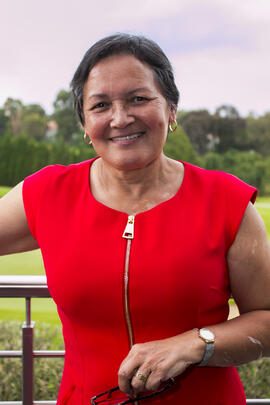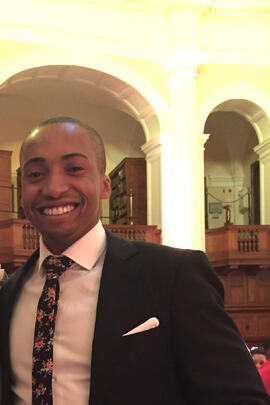Interview with Belinda Marais 1989 - Staff
- ZA ZAR STDS 202000710
- Unidad documental simple
- 2014
Interview with Belinda Marais – Staff – 1989
Belinda began her teaching career working in government schools but after 8 years she took a break, saw
an advert for the position at St David’s and applied. She was interviewed by Brother Brendan and Trudy
Elliott and was appointed as head of the Afrikaans department commencing employment in January 1989.
The first task she was given was to mark the grade 11 Afrikaans exam paper. As it was literature, Belinda
had to first read the book and set the memo before she could begin marking. The previous head of
department had left and she had no-one to consult with. It was a difficult time for the school with a new
headmaster, Paul Davies and prep headmaster, Greg Royce and numerous newly appointed members of
staff including Leon Benade (deputy head of the prep school), Gary Norton, Biology, and new Maths and
Geography teachers. Having never taught at a TED school before, it was quite a challenge for Belinda and
initially she liaised with a teacher from Sandown High.
Sifiso Ngwenya, the first black headboy and junior city major, was in her class and distinguished himself by
achieving an A for Afrikaans in his matric. The discipline was poor and Belinda was the only black on the
staff, teaching a subject which the boys hated, but she held her own. Other boys she taught then were
Frederick Barnard and his brother Chris was also at St David’s. She remembers Cedric de Trevou whose
son is in grade 9 and Earl Morais whose son is now in the prep school.
Paul Davies was instrumental in restructuring the house system which became more established and
Champagnat medals were introduced for the first time. Paul Davies left in 1994 and Gary Norton was
acting headmaster until Paul Edey was appointed and took up the position in 1995. Belinda has seen a lot
of changes at St David’s however many things remain the same and the heart of the place is very much the
same.
A highlight for Belinda was the pilgrimage in which she participated in 2001 when she visited Rome and the
Hermitage. Belinda felt that the pilgrimage made everything so much more real; opening up a whole new
world and things became more tangible. Belinda grew up as a Catholic although she is a non-practising
one.
Belinda has always been very involved with the SMILE programme which was initiated in 1993 by Robin
Henderson, an English teacher. She was contacted by an NGO and began to implement the programme
started by St Mary’s in Kloof – St Mary’s Interactive Learning Experience. Robin left the following year and
Belinda took over. The value of the programme was in teaching English oral skills but the interaction of the
boys with younger children from poorer communities was mutually beneficial. Belinda also feels that it is a
very practical programme and has a definite purpose. She currently liaises with two schools in Tembisa –
Ebony Park Primary and Drake Koka Primary School whose staff are willing to accompany the children. Mr
Edey was always very supportive and helped out during the holidays participating as a SMILE guide and
other teachers took the classes. The holidays are no longer covered with St David’s having three terms
and the government schools having four. However, thirty Wednesdays per year are covered, with Ebony
Park’s grade 5’s coming for the first half of the year and Drake Kaka‘s children coming for the second half.
The children benefit from the help and enjoy the food and drink they are given.
Belinda has always been very instrumental in the success of Champagnat day which originally was a mass
followed by soccer matches between the staff, prefects and pupils, the boys were given a cool drink and a
doughnut and everything finished around 11am. In 1994 the staff bursary fund was established and Belinda
suggested raising funds by selling, food etc. on Champagnat day. It started off in the prep school pavilion
with Belinda buying sweets and cool drinks on special and asking mothers to help making some food to
sell. In 2013 the more extensive and established Champagnat day festivities raised R113 000.00 for the
bursary fund.
As Belinda was employed at St David’s her two sons became pupils. Terry went into grade 0 in 1989
followed later by Bradley. Terry matriculated in 2001 and Bradley in 2005. St David’s played a significant
role in her sons’ lives, they were very happy at St David’s and Belinda would not have been able to afford
the school fees had she not been a teacher. Terry is currently a teacher of Music in London, a pianist giving
recitals and Bradley is training to be a lawyer and is doing his articles with Lowndes and Dlamini.
Belinda believes that St David’s is an authentic community with the brothers, colleagues, boys and parents
and this is what she loves and appreciates about St David’s. St David’s has had a great influence on her
life, she feels valued.
Belinda is very much a people’s person, various individuals have impacted on her life, but as staff change
she feels they bring a renewed energy and value with them. Children are children and if you treat them
fairly and as fellow human beings they will respect you and do what you want. Belinda has enjoyed the
rapport, with the occasional hiccup; she has had with the boys over the past 25 years and has observed
that they carry with them a special conscience when they leave. St David’s has done something right.
Belinda still enjoys teaching and wouldn’t want to do anything else and feels that it has, on the whole been
a pleasant experience. JLE Feb’2014
Egenrieder, Julie


